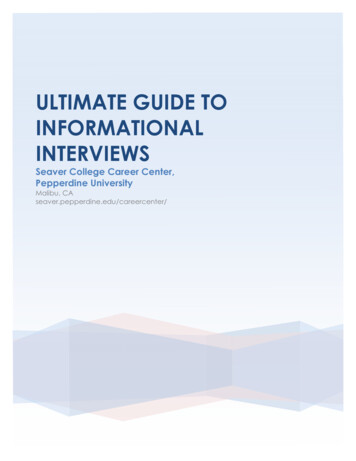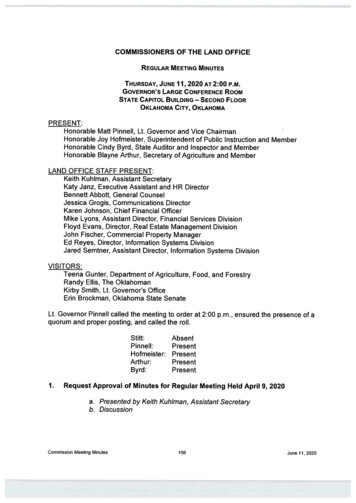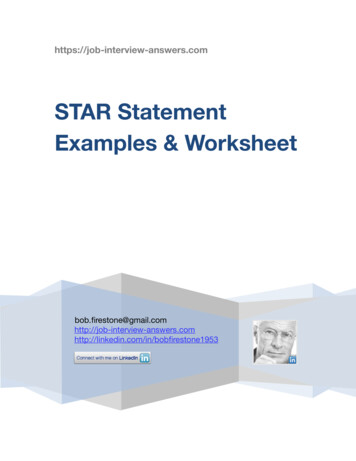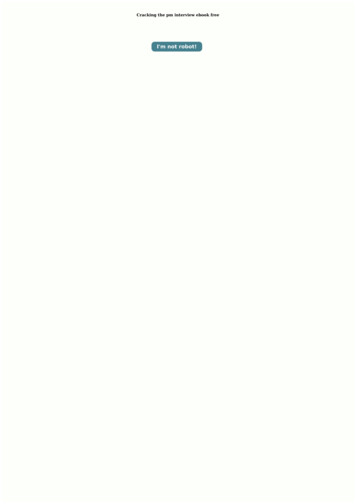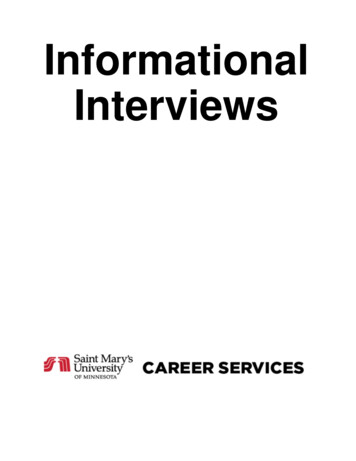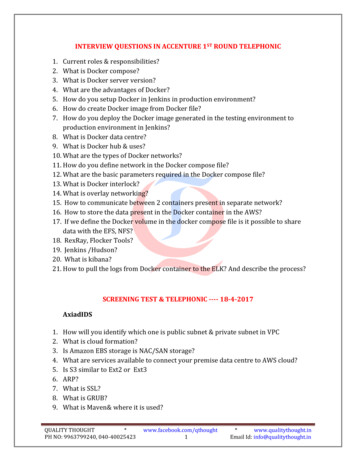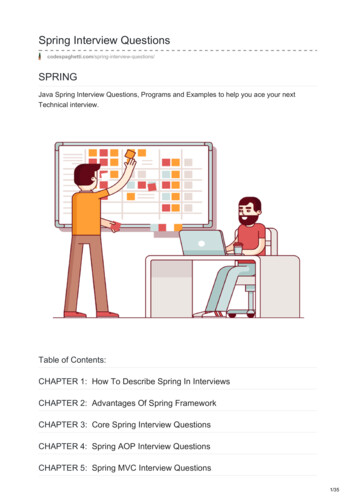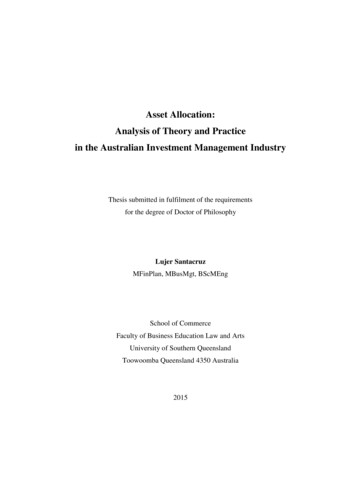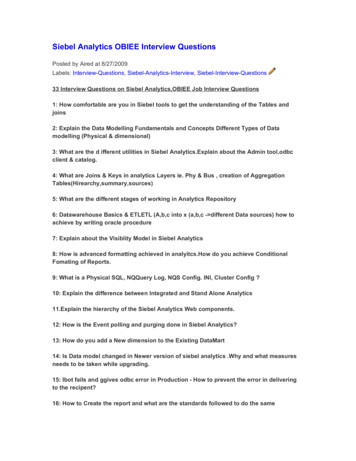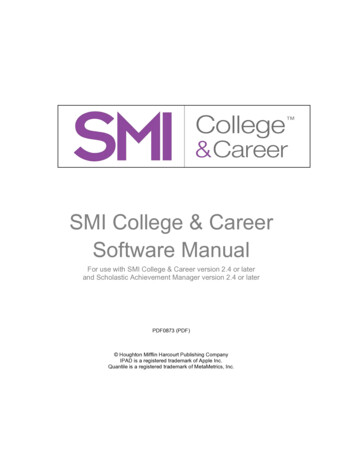
Transcription
INFORMATIONALINTERVIEWInformational Interviews .13Why Conduct an Informational Interview . .14How Do I Set Up an Informational Interview . .14Locate Contacts . .15Informational Interview Phone Script . .16Contact Worksheet . .17Sample Confirmation Script .18Informational Interview Worksheet . .19Questions to Ask .19Questions to Answer After The Interview . .20Business Cards .21Tips For Writing Thank You Notes .23Interview Do’s and Don’ts .23
Informational InterviewsWhat is an Informational Interview?Informational interviewing is a technique that is used to gather careerinformation from professionals in the field. Contact someone in a selectedcareer field and ask if he or she is willing to give you time to discuss careers.Emphasize the fact that you are not looking for a job, but for informationwhich might assist you in your career decisions and job search. Conductingan informational interview will not only enable you to learn firsthand abouta particular kind of work in a specific career and/or organization, but it isalso a great networking tool.The Process Identify people who work infields or companies of interest toyou. Contact your leads and explain13 Informational Interviewyou are seeking personalizedinformation about their field. Ask if you can meet at theirworksite for an informationalinterview which would takeabout twenty minutes. Review your research on thefield/industry and research thespecific company you will visit. Call the day before to confirm. Arrive 10 minutes early.Follow-Up Ask for a business card whenleaving the individual’s office. Write and send a thank you noteto each individual with whomyou spoke, and send by mail/email within 24-hours after theinformational interview.
Why conduct an Informational Interview?One out of every 200 resumesresults in a job offer. One out ofevery 12 informational interviews,however, results in a job offer.(Compiled from QuintessentialCareers — quintcareers.com)Informational interviewingis the ultimate networkingtechnique, especially consideringthat the purpose of informationalinterviewing is not to get joboffers. Job offers just happen tobe a delightful side benefit to thevaluable practice.The informational interview isdesigned to produce information.This information will help you chooseor refine a career path. You can learnhow to break in and find out if youhave what it takes to succeed.It is an expanded form ofchatting with your networkcontacts. This process of spendingtime with one of your networkcontacts in a highly focusedconversation will provide you withkey information you need to launchor boost your career.You accomplish several thingswhen you go out on informationalinterviews. You obtain a great deal ofinformation about your careerfield and the skills needed todo that job effectively. It is alsohelpful, for creating your resume. You gain a perspective of workthat goes beyond the limitationsof job titles, allowing you to seenot only what skills are requiredfor the job, but also how youmight fit into a work setting. You gain insight into the hiddenjob market (employmentopportunities that are notadvertised).How do I set up an Informational Interview?Start by making contact withpeople in the career field. Youcan do this in a number or ways: First: connect with peopleyou know who are in thecareer field you are interestedin learning more about. You have the opportunity tomake personal contacts withworking professionals. You become aware of the needsof the employers and the realitiesof employment.View updates/resources online at: mntechnology.com/employmentservices Second: think about peopleyou know or can easily meetwho may know someone inthe field you’re interested in. Third: search the Internet,career fairs or professionalorganizations just to name afew. You gain confidence in talkingwith people while learningwhat you need to know. Thisexposes you to a variety of jobsand personalities of companiesmaking the search for your“niche” that much easier.Informational Interview 14
Locate ContactsInstructions: List six prospective employers who work inyour area of interest. These leads can come from peopleyou know, the Internet, or any other source. You are tocall each prospect until your interview(s) have beenscheduled.Contact 1Contact 4Organization Name:Organization Name:Individual’s Name:Individual’s Name:Phone Number:Phone Number:Contact 2Contact 5Organization Name:Organization Name:Individual’s Name:Individual’s Name:Phone Number:Phone Number:Contact 3Contact 6Organization Name:Organization Name:Individual’s Name:Individual’s Name:Phone Number:Phone Number:15 Informational Interview
Informational InterviewPhone ScriptWhen you are not looking for employment, but simply want to obtain information about a type of job, it is called an“informational interview.” It is easy to talk to someone you know, but making a cold call requires some preparation.The benefits are well worth the effort and you will find that it gets easier each time. Use the following as a guide tohelp you set an appointment for your informational interview.SAMPLE ScriptNow, personalize a script using the contact’s name, yourname, and area of interest.[Ms. Forbes,] I’m [Jill Smith.] I amtaking a course in Career Explorationat Moore Norman TechnologyCenter in which one of my projectsis to interview someone in a field ofinterest to me. I am very interestedin [Medical Assisting], and since youare knowledgeable in the field, Iwould like very much to hear someof your personal views. I knowyou are very busy, but would it bepossible to have 20 minutes of yourtime in the near future to discussaspects of your job? When would bea convenient time for me to come bythe clinic and talk with you?View updates/resources online at: mntechnology.com/employmentservicesInformational Interview 16
Contact WorksheetInstructions: Document your employer informational interview(s).Organization NameOrganization AddressPhone NumberPerson ContactedPerson’s TitleInterview DateInterview TimeOrganization NameOrganization AddressPhone NumberPerson ContactedPerson’s TitleInterview DateInterview TimeOrganization NameOrganization AddressPhone NumberPerson ContactedPerson’s TitleInterview DateInterview Time17 Informational Interview
Sample Confirmation ScriptReceptionist:ABC WidgetCompany, howmay I direct your call?You: Ms. Forbesoffice, please.Ms. Forbes:This is Ms.Forbes, may Ihelp you?You: Hello,Ms. Forbesmy name isJill Smith and I amcalling to confirm ourappointment at 9 a.m.tomorrow.Ms. Forbes: Yes,tomorrow at9 a.m. is fine.You: Thank you,I look forwardto meetingwith you.Ms. Forbes:I’ll see youtomorrow,good bye.You: Good bye.Telephone Etiquette tips When you call: Know what you want to say, so there are not lots of"ahh"s, "umm"s and pauses, while the other personwaits. Don’t talk too quickly, too slowly, too quietly or tooloudly. Do not use inappropriate language Do not sound unhappy, angry, sad or bored. Do not chew gum, eat, smoke, or drink while talkingon the phone. If they have to call you back: Make sure the people who answer your phone are notrude, unprofessional, or negative. You have a way for them to leave a voicemail. You do not have an inappropriate voicemail messagethat gives a negative impression of who you are.View updates/resources online at: mntechnology.com/employmentservicesInformational Interview 18
Informational Interview WorksheetPerson Interviewed:Date of Interview:Person’s Title:Organization:Phone Number:Address:Email:Questions To Ask1. How did you decide to become a []?2. What is a typical day like for you?3. What kind of skills would I need to be successful in this industry?4. What is a typical entry-level salary in this profession? How do the salaries progress after five years?5. What do you like most/least about your job?6. What preparation would you suggest for someone interested in entering this field?7. Do you have any special advice for entering this field.8. Whom do you recommend I contact for more information about job opportunities in this industry?9. May I contact you if necessary in the future?Be sure to thank the person for their time before leaving.19 Informational Interview
Questions to Answer After the Interview1. Is this a career you would be interested in? (circle one)YESNOIf so, why?If not, why?2. What are some things you can do to prepare to achieve this career y involvement:Activities:3. What are you already doing that will help you obtain a career in this field?4. What skills were mentioned in the interview that you already possess that could be added to your resume?Skills:View updates/resources online at: mntechnology.com/employmentservicesInformational Interview 20
Business CardsAttach thebusiness card(s)you collect here.Moore Norman Technology CenterFRANKLIN ROAD CAMPUS SOUTH PENN CAMPUSTina Fitzgerald, PHR21 Informational InterviewMAILING ADDRESSEmployment AdvisorEmployment ServicesP.O. Box 4701Norman, OK 73070-47014701 12th Ave N WNorman, OK 73069(405) 364-5763, ext. 7293(405) 360-9989 faxtina.fitzgerald@mntc.eduwww.mntechnology.com
Common Screen-OutsON PAPER (Resume, Applications, Letters): No evidence of recently having done thejob you are applying for Appear better suited for a different jobor more interested in a different field Over-qualified Post-graduate degree with no practicalexperience No evidence you were good at your job Mediocre or poor schools grades No recent work / education history Pattern of staying less than 1 year No work history in this country False statements which can be checked Hobbies that are controversial,dangerous or could interfere with work No references, or they are all unemployed, or listed as your socialworker, psychiatrist, addictioncounselor, etcCriminal convictions, chronic illness, orlegal case brought against an employerLimited availability regarding hours ordays“Reason for Leaving” raises a concern,fired, e.g. laid-off more than twice, gapafter pregnancy & still of child bearingageGaps in work history“Reason for Leaving” does not matchother information, e.g. “Left for betteropportunity,” without starting a “betterjob” Asks for the top of their wage/salaryrange Several past employers are “out-ofbusiness” so reference cannot bechecked Unprofessional look: misspellings, poorgrammar, typos, untidiness Incomplete application, or saying “SeeResume” Resumes with poor or inappropriatelay-out, or looks similar to others they’veread Too long (will be put in the “Read Later”pile which is seldom read)IN-PERSON (Interviews, internships): Personality doesn't fit with the companyculture or doesn’t match what theyexpected based on the resume or coverletter Presentation (dress, non-verbal, style)does not match the company’s image, ordoesn’t match what they expected basedon the resume or phone conversation,e.g., weight, age, ethnicity, gender Visible tattoos and piercings Body odor, cigarettes, or too muchperfume/cologne Demonstrating limited knowledgeabout, or interest in, the company or job Poor eye contact when greeting ortalking Nervous habits, e.g. playing with hair, atwitching eye, or drumming fingers One word answers and offering noexamples, stories or proof Talk too much, argue with, or interruptthe interviewer Acting desperate, angry, or showing noemotion at all Speaking negatively about pastemployers, co-workers or supervisors "Name drops" too much You don’t seem to know what is writtenon your resume or application Bringing children or friends to theinterview Being rude or obnoxious to thereceptionist while waiting to beinterviewed Being late for the interview Not knowing current terminology,proper names for tools or procedures,or lacking the level of knowledge or skillexpected Failing to demonstrate that you offer ahard to find skill or attitude During internship, failing todemonstrate that they will be one oftheir best workers and are worth themoney to be paid The reference doesn’t know the jobyou’re going for, hasn’t talked to yourecently, or isn’t familiar with your skillsfor the job The reference talks about your skills fora different job, rather than the one youare applying for Reference does not return phone calls The reference focuses on why thecompany should give you a chance, ratherthan what you can do for the company Your current employer is too excitedabout, or supportive of you leaving Your current employer is reluctant to sayanything about you, as if fearful of beingsued. Lack of Internet or computer skills,seen in your inability to downloaddocuments or links they send, or yourslow response (should respond within24 hours) Poor spelling, grammar or writingskills demonstrated in emails, a webinterview, or on-line chat Information on your Internet site orgiven during a web chat that conflictswith info on resume or given during theinterviewREFERENCES: The person who recommends youis an average to poor employee, or atroublemaker The reference shares problems you havehad either on the job (e.g. being late,not getting along with others, fired) orin your personal life (addiction, illness,depression)INTERNET: Offensive email address Information on your personal website,blog or social network site whichconflicts with company image, values orgoals Negative information discovered whenthey do a search of your nameView updates/resources online at: mntechnology.com/employmentservicesInformational Interview 22
Tips For Writing Thank You Notes When to Send It: Write and sendyour note no later than 24-hoursafter the interview. Paper and Envelope: Use agood quality notepaper withmatching envelope. Avoid “cute”covers. A simple “Thank You”on the front will do. Off-whiteand buff colors appear moreprofessional. Typed vs. Handwritten: Ahandwritten note is fine unlessyour handwriting is illegible orsloppy. If so, type it. Make sure allspelling is correct. You may wantsomeone to proofread it beforemailing. Salutation: Unless youpersonally know the individualyou are thanking, do not usehis/her first name. Write “DearPam Smith” or “Dear Ms. Smith.”Include the date. The Note Itself: Keep it short andfriendly. Paragraph 1: Thank theindividual for taking the timeto visit with you. Paragraph 2: Share somethingyou gained from the interview.SAMPLE THANK YOU NOTEJune 19, 2002Dear [Ms. Forbes,]Thank you for taking the time to discuss your position andorganization with me. It was a pleasure meeting you and seeingyour clinic first hand.The information you shared with me provided a new perspective ofthe position, a better understanding of the requirements of the job,and increased my interest in [medical assisting.]Again, thank you for your time. I appreciate the information youshared with me and look forward to the possibility of one-daybecoming a medical assistant for a facility such as yours.Sincerely,Jill SmithJill Smith Paragraph 3: Thank theindividual again and expressan interest in working inhis/her field or with theorganization in the future. Your Signature: Always sign yourthank you note. Use your first andlast name. Avoid initials and makeyour signature legible.Interview Do’s and Don’tsDODON’T23 Job Applications Be on time Research the company Dress appropriately Study potential questions Respect all people in the office Thank the interviewer Be straightforward Listen intently Be professional Follow up Send a thank you note NEVER ask for a job: Don't mix informational interviewing with job seeking. Employers willgrant informational interviews when they firmly trust that you will not ask them for a job.The minute you begin trying to get a job, the employer will feel misled. If you discover a jobthat you do want to apply for during the interview, wait until the informational interview isover. The next day, call the employer and tell your contact that the informational interviewnot only confirmed your interest in the field, but also made you aware of a position that youwould like to formally apply for.
19 Informational Interview Informational Interview Worksheet person Interviewed: person's Title: Address: date of Interview: Organization: phone Number: Email: 1. how did you decide to become a [ ]? 2. What is a typical day like for you? 6. What preparation would you suggest for someone interested in entering this field?
